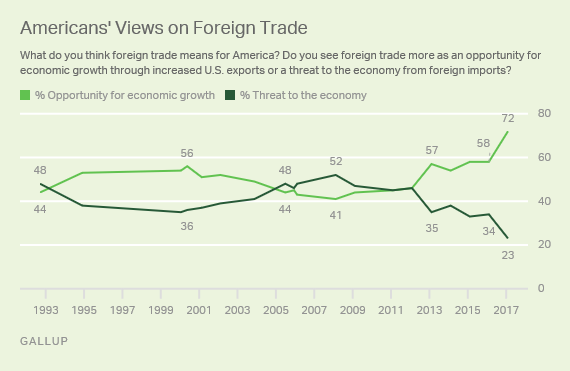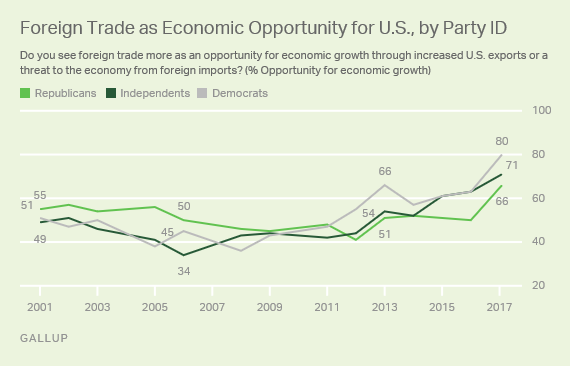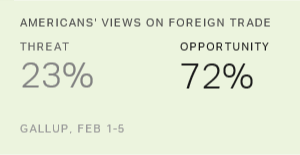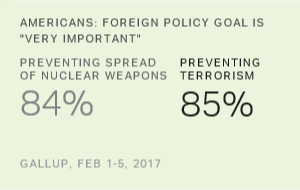Story Highlights
- 72% view foreign trade as an economic opportunity, 23% as a threat
- 71% say promoting favorable trade policies is "very important"
- All political party groups increasingly see trade as an opportunity
WASHINGTON, D.C. -- A record-high 72% of Americans see foreign trade as an opportunity for economic growth. This is up sharply from 58% last year, after much debate about trade during the presidential election cycle.

These results are from Gallup's annual World Affairs survey, conducted Feb. 1-5.
Foreign trade was a major theme of the 2016 presidential election, with Donald Trump and Bernie Sanders having denounced trade agreements such as the North American Free Trade Agreement and the Trans-Pacific Partnership. However, rather than rejecting agreements like these outright, President Trump has promised to replace multinational agreements such as the TPP with bilateral deals on more favorable terms for the U.S. This reasoning may help explain why more Americans now see trade as a mechanism for economic growth.
Americans' view that trade is an opportunity for economic growth has fluctuated since 2000. The low point was 41% in 2008, during the 2007-2009 recession. However, the percentage holding this view was also low in 2005-2006, when the economy was in much better shape. It is possible that Americans were less likely to view trade as an economic opportunity then because there was less emphasis on the matter during the George W. Bush administration. During Barack Obama's tenure, a push for trade with countries in the Asia-Pacific region thrust the issue back into the spotlight.
Americans are also modestly more positive about trade in response to another question Gallup asked in the same survey. Seventy-one percent say promoting favorable trade for the U.S. is a "very important" foreign policy goal, up from 66% in 2013, the last time the question was asked.
Across All Parties, More See Trade as an Opportunity
All political party groups show an increase from last year in the view that trade is an economic opportunity. Among Democrats, this view has increased 17 percentage points to 80%, while among Republicans it has risen 16 points to 66%. The increase is smaller among independents -- up eight points to 71%.
For all party groups, the percentages viewing foreign trade as an economic opportunity are at record highs. The previous high mark for Democrats was 66% in 2013, and for Republicans it was 57% in 2002. Since 2012, Democrats have been more positive about trade than Republicans have been. From 2001 to 2009, the opposite was true.

Bottom Line
A record-high 72% of Americans believe foreign trade is good for the U.S. economy, and an equal proportion believe promoting favorable trade policies in foreign markets is a very important goal. Despite the often-negative characterization of U.S. trade deals throughout the 2016 campaign, there has been an increase among all party groups in perceptions that trade is good for the country. For Democrats, this may be a sort of rebellion against Trump's anti-trade pronouncements. Among Republicans, this sentiment may be up due to a belief that U.S. trade will flourish under a Trump administration.
In the first few days of Trump's presidency, he announced that the U.S. was withdrawing from the TPP. Trump also has pledged to rework other trade agreements, to the consternation of some and delight of others. Nevertheless, it is clear that Americans across party lines now believe trade is compatible with domestic economic opportunity.
Historical data are available in Gallup Analytics.
Survey Methods
Results for this Gallup poll are based on telephone interviews conducted Feb. 1-5, 2017, with a random sample of 1,035 adults, aged 18 and older, living in all 50 U.S. states and the District of Columbia. For results based on the total sample of national adults, the margin of sampling error is ±4 percentage points at the 95% confidence level.
Each sample of national adults includes a minimum quota of 70% cellphone respondents and 30% landline respondents, with additional minimum quotas by time zone within region. Landline and cellular telephone numbers are selected using random-digit-dial methods.
View survey methodology, complete question responses and trends.
Learn more about how the Gallup Poll Social Series works.



